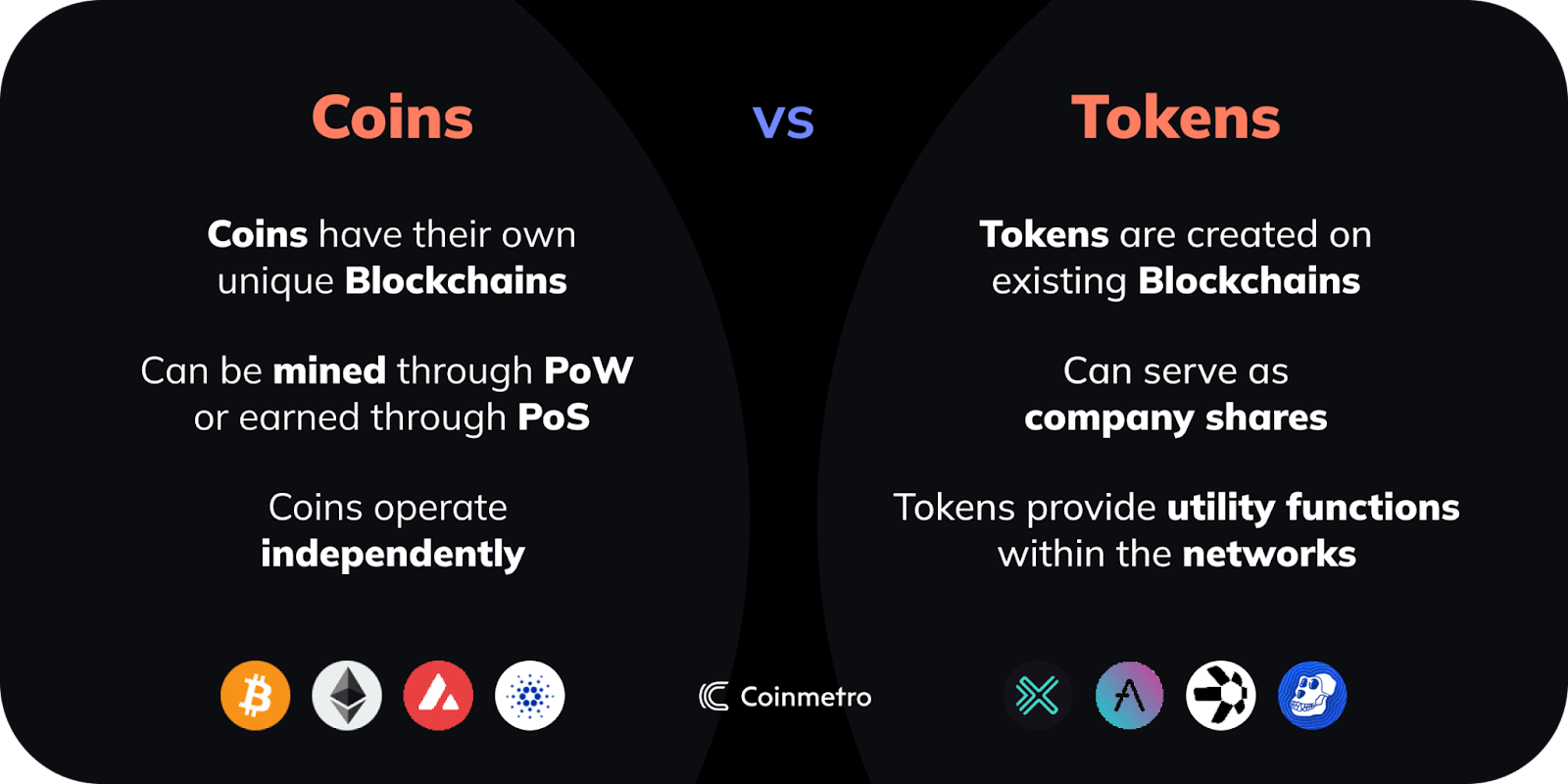The Difference Between Coins & Tokens
December 5, 2025

by Kamil S
December 5, 2025
What is the difference between coins and tokens in crypto? No matter how frequently these terms are used – and often misused – one thing is certain: the two fundamental words are not synonyms.

A cryptocurrency that possesses its own native blockchain network is referred to as a coin. For instance, the most widely known and used coin, Bitcoin (BTC), is wholly supported by its own blockchain network.
Similar to traditional currencies, crypto coins are primarily intended to serve as a form of value storage and a medium of exchange.
Although the underlying technologies of cryptocurrencies are typically created from scratch, the existing source codes are also used to coin new digital currencies. Litecoin (LTC) being based on the open source protocol of Bitcoin is a good example.
The main difference between tokens and coins is that a token runs on another blockchain. The most popular and used types of tokens, ERC-20 and ERC-677, operate on the Ethereum blockchain. The mother of all token standards, ERC-20 is used to create and issue smart contracts, whereas ERC-677 is an extension of ERC-20, offering useful functionality without conflicting with the primary standard. Moreover, ERC-20 is used by smart contracts for accounting.
Did you know that LINK (Chainlink) is the most popular ERC-677 token? Chainlink can connect a variety of data types with different blockchains, opening up a wide range of potential applications for this decentralized oracle.
For anyone new to Coinmetro, XCM is the native utility token of the Coinmetro platform. It fuels our entire ecosystem and acts as an access point to ever-growing rewards and perks for holders.
It is interesting to know that in addition to serving as a digital representation of non-fiat assets traded on-chain, such as NFTs, tokens can also be used to exchange money. Exchange tokens function just like any other cryptocurrency token. You can trade them on secondary markets or hold them for speculative purposes.
Last but not least, tokens can be used to digitally trade real-world assets, such as stock, gold, or real estate, etc.

Here are the important points to be noted when comparing crypto coins and tokens:
- Tokens are much easier to create. Rather than writing a new code, you can utilize the one available on an open-source blockchain platform. In other words, anyone can create their own token – even if just for fun!
- As compared to coins, tokens have a different structure. Tokens are created on existing blockchains like the Ethereum blockchain, as opposed to coins, which have their own unique blockchains.
- Coins are a form of digital currency that can be used to buy or sell goods and services, whereas tokens can serve as company shares.
- Finally, tokens may provide various use-cases within the networks, depending on the project. For instance, as a form of payment within specific blockchain platforms, whereas coins operate independently.
- Unlike tokens, coins are created on independent blockchain networks.
- Unlike coins, tokens can be used to digitally represent practically any asset in the world.
If you found this article helpful and want to learn more about crypto, dive into our Learning Lab and become more knowledgeable from multiple angles. We encourage you to also join our Discord and Telegram channels to chat with like-minded people and discover something new every day.
Ultimately, theory is important, but practice makes perfect. Whenever you feel ready, Sign Up for a Coinmetro account to put your knowledge to work! If you are a registered user, feel free to Log In to your account now.
Tags
Related Articles

Regulatory Sandboxes: Fostering Crypto Innovation Within Legal Frameworks
The cryptocurrency industry’s fast rise fuels an important debate. Innovation aims to transform finance, enhancing speed and access. Yet, regulators…
5m

Crypto Options Trading: Strategies and Market Insights
Cryptocurrency markets have rapidly expanded beyond simple buying and selling. One of the most significant developments has been the rise of…
6m

The Rise of Social-Fi: Blending Social Media with Decentralized Finance
In recent years, social media and finance have started to merge, creating Social-Fi. This concept blends the engagement of social platforms with…
6m

DeFi Insurance Platforms to Watch in 2024
Decentralized Finance (DeFi) insurance addresses the growing need for insurance against hacks, smart contract failures, and other DeFi-related risks.…
7m